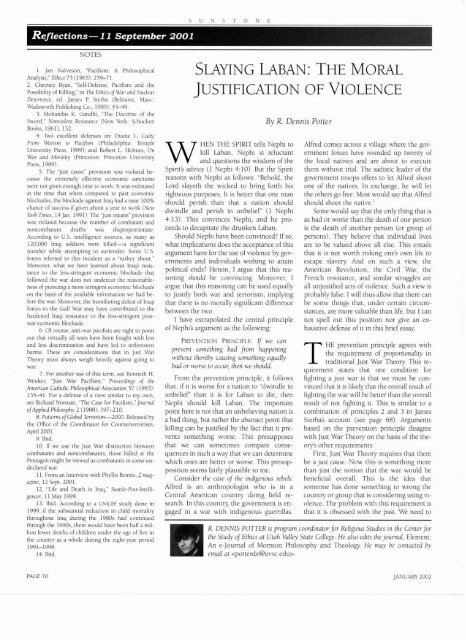Eugene England - Sunstone Magazine
Eugene England - Sunstone Magazine
Eugene England - Sunstone Magazine
Create successful ePaper yourself
Turn your PDF publications into a flip-book with our unique Google optimized e-Paper software.
NOTES<br />
1. Jan Narveson, "Pacifism: A Philosophical<br />
Analysis," Ethics 75 (1965): 259-71.<br />
2. Cheyney Ryan, "Self-Defense, Pacifism and the<br />
Possibil~ty of Killing," in The Ethics of War and Nuclear<br />
Deterrence, ed. James l? Sterba (Belmont, Mass.:<br />
Wadsworth Publishing Co., 1985), 4549.<br />
3. Mohandas K. Gandhi, "The Doctrine of the<br />
Sword," Nonviolent Resistance (New York: Schocken<br />
Books, 1961). 132.<br />
4. Two excellent defenses are Duane L. Cady.<br />
From Warism to Panfism (Philadelphia: Temple<br />
University Press, 1989); and Robert L. Holmes, On<br />
War and Morality (Princeton: Princeton University<br />
Press, 1989).<br />
5. The "ust cause" provision was violated because<br />
the extremely effective economic sanctions<br />
were not given enough time to work. It was estimated<br />
at the time that when compared to past economic<br />
blockades, the blockade against Iraq had a near 100%<br />
chance of success if given about a year to work (New<br />
York Times, 14 Jan. 1991). The "just means" provision<br />
was violated because the number of combatant and<br />
noncombatant deaths was disproportionate.<br />
According to U.S. intelligence sources, as many as<br />
120,000 Iraqi soldiers were killed-a significant<br />
number while attempting to surrender. Some U.S.<br />
forces referred to ths incident as a "turkey shoot."<br />
Moreover, what we have learned about Iraq's resistance<br />
to the less-stringent economic blockade that<br />
followed the war does not undercut the reasonableness<br />
of pursuing a more stringent economic blockade<br />
on the basis of the available information we had before<br />
the war. Moreover, the humiliating defeat of Iraqi<br />
forces in the Gulf War may have contributed to the<br />
hardened Iraqi resistance to the less-stringent postwar<br />
economic blockade.<br />
6. Of course, anti-war pacifists are nght to point<br />
- A<br />
out that virtually all wars have been fought with less<br />
and less discrimination and have led to unforeseen<br />
harms. These are considerations that in Just War<br />
Theory must always weigh heavily against going to<br />
war.<br />
7. For another use of this term, see Kenneth H.<br />
Wenker, 'Yust War Pacifism," Proceedings of the<br />
American Catholic Philosophical Assoc~ation 57 (1983):<br />
135-41. For a defense of a view s~milar to my own.<br />
see Richard Norman, "The Case for Pacifism,"Joumal<br />
ofApplied Philosophy 2 (1988): 197-210.<br />
8. Pattems of Global Terrorism-2000. Released by<br />
the Office of the Coordinator for Counterterrorism,<br />
April 2001.<br />
9. Ibid.<br />
10. If we use the Just War distinction between<br />
combatants and noncombatants, those killed at the<br />
Pentagon might be viewed as combatants in some undeclared<br />
war.<br />
11. From an Interview with Phyllis Bennis, Z magazine,<br />
12 Sept. 2001.<br />
12. "Life and Death in Iraq," Seattle-Post-Intelligencer,<br />
11 May 1999.<br />
13. Ibid. According to a UNICEF study done in<br />
1999, if the substantial reduction in child mortality<br />
throughout Iraq during the 1980s had continued<br />
through the 19905, there would have been half a million<br />
fewer deaths of children under the age of five in<br />
the country as a whole during the eight-year period<br />
1991-1998.<br />
14. Ibid.<br />
SLAYING LABAN: THE MORAL<br />
JUSTIFICATION OF VIOLENCE<br />
w<br />
HEN THE SPIRIT tells Nephi to<br />
kill Laban, Nephi is reluctant<br />
and questions the wisdom of the<br />
Spirit's advice (1 Nephi 4:lO). But the Spirit<br />
reasons with Nephi as follows: "Behold, the<br />
Lord slayeth the wicked to bring forth his<br />
righteous purposes. It is better that one man<br />
should perish than that a nation should<br />
dwindle and perish in unbelief" (1 Nephi<br />
4:13). This convinces Nephi, and he proceeds<br />
to decapitate the drunken Laban.<br />
Should Nephi have been convinced? If so,<br />
what implications does the acceptance of this<br />
argument have for the use of violence by governments<br />
and individuals wishing to attain<br />
political ends? Herein, I argue that this reasoning<br />
should be convincing. Moreover, I<br />
argue that this reasoning can be used equally<br />
to justify both war and terrorism, implylng<br />
that there is no morally significant difference<br />
between the two.<br />
I have extrapolated the central principle<br />
of Nephi's argument as the following:<br />
PREVENTION PRINCIPLE: If we can<br />
prevent something bad from happening<br />
without thereby causing something equally<br />
bad or worse to occur; then we should.<br />
From the prevention principle, it follows<br />
that, if it is worse for a nation to "dwindle in<br />
unbelief' than it is for Laban to die, then<br />
Nephi should kill Laban. The important<br />
point here is not that an unbelieving nation is<br />
a bad thing, but rather the abstract point that<br />
killing can be justified by the fact that it prevents<br />
something worse. This presupposes<br />
that we can sometimes compare consequences<br />
in such a way that we can determine<br />
which ones are better or worse. This presupposition<br />
seems fairly plausible to me.<br />
Consider the case of the indigenous rebels:<br />
Alfred is an anthropologst who is in a<br />
Central American country doing field research.<br />
In this country, the government is engaged<br />
in a war with indigenous guerrillas.<br />
By R. Dennis Potter<br />
Alfred comes across a village where the government<br />
forces have rounded up twenty of<br />
the local natives and are about to execute<br />
them without trial. The sadistic leader of the<br />
government troops offers to let Alfred shoot<br />
one of the natives. In exchange, he will let<br />
the others go free. Most would say that Alfred<br />
should shoot the native.'<br />
Some would say that the only thing that is<br />
as bad or worse than the death of one person<br />
is the death of another person (or group of<br />
persons). They believe that individual lives<br />
are to be valued above all else. This entails<br />
that it is not worth risking one's own life to<br />
escape slavery. And on such a view, the<br />
American Revolution, the Civil War, the<br />
French resistance, and similar struggles are<br />
all unjustified acts of violence. Such a view is<br />
probably false. I will thus allow that there can<br />
be some things that, under certain circumstances,<br />
are more valuable than life, but I can<br />
not spell out this position nor gve an exhaustive<br />
defense of it in this brief essay<br />
T<br />
HE prevention principle agrees with<br />
the requirement of proportionality in<br />
traditional Just War Theory. This requirement<br />
states that one condition for<br />
fighting a just war is that we must be convinced<br />
that it is likely that the overall result of<br />
fighting the war will be better than the overall<br />
result of not fighting it. This is similar to a<br />
combination of principles 2 and 3 in James<br />
Sterba's account (see page 68). Arguments<br />
based on the prevention principle disagree<br />
with Just War Theory on the basis of the theory's<br />
other requirements.<br />
First, Just War Theory requires that there<br />
be a just cause. Now this is something more<br />
than just the notion that the war would be<br />
beneficial overall. This is the idea that<br />
someone has done something to wrong the<br />
country or group that is considering using violence.<br />
The problem with this requirement is<br />
that it is obsessed with the past. We need to<br />
R. DENNIS PO7TER is program coordinatorfor Religous Studies in the Centerfor<br />
the Study of Ethics at Utah Valley State College. He also edits the journal, Element:<br />
An e-Journal of Mormon Philosophy and Theology. He may be contacted by<br />
email at .<br />
PAGE 70 JANUARY 2002

















